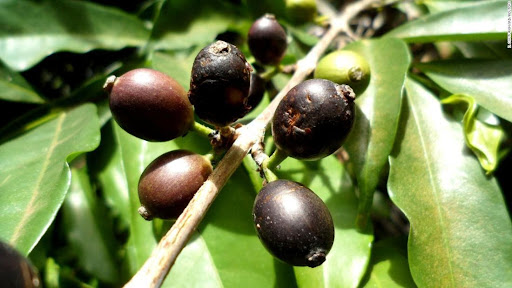
West Africa is poised to make a comeback in the global coffee industry, following the rediscovery of a long ‘lost’ species of the beans in Sierra Leone.
Researchers recently announced the rediscovery of Coffea stenophylla, which they say could be a game changer in an industry currently dominated by one species – Arabica – which itself faces threats from climate change.
Arabica is popular due its superior taste. But according to this study, not only does stenophylla has an equivalent taste, it can also grow in harsher temperatures.
The scientists from UK and Sierra Leone, in a publication in the journal Nature Plants on April 19, say Stenophylla’s “unique combination of tolerance to high temperatures and a superior flavour” could serve as a lifeline to the multibillion dollar industry, which has been vulnerable to climate change.
Out of the 124 coffee species known worldwide, Arabica and Robusta comprise 99% of consumption. Robusta and the others which are mostly used to produce instant coffee, are considered of lower quality and therefore attract much lower price.
Arabica is grown mostly in the eastern region of Africa and in South Arabia, which are experiencing hotter climatic conditions. Experts predict that in the long term this could “significantly” affect production and quality.
The search for stenophylla started in 2014. In 2018 the researchers found plants in two reserves in forest patches in central and eastern Sierra Leone. They were eventually tested and found to match the qualities they were looking for.
Professor Jeremy Haggar of the Natural Resources Institute of the University of Greenwich, UK, one of the researchers, said their objective was to determine the potential of stenophylla coffee to provide an alternative for local farmers and as possible replacement for arabica as it faces threat from climate change.
“The key findings are two fold. Firstly that Stenophylla coffee has very good quality, equivalent to a specialty Arabica coffee. Second that Stenophylla coffee naturally grows in a much warmer climate than Arabica coffee, if Arabica coffee production becomes affected by climate change it may be that Stenophylla can replace it,” Haggar tells SciDev.Net.
Along with cocoa, coffee is one of the top two major cash crops of Sierra Leone. Between the 1800s and early 1900s, Sierra Leone played a major role in the global coffee industry through large scale production of Stenophylla coffee. It is believed that the introduction in the region of Robusta led to the displacement of Stenophylla.
Stenophylla was last known to grow in the wild only in Sierra Leone, Liberia and Cote d’Ivoire. The researchers say large-scale deforestation in these countries poses further threat of extinction to the plant.
But Dr Aaron Davis of the UK’s Royal Botanic Gardens, Kew, who led the research team, said their discovery may help in the “future-proofing” of the industry, noting that stenophylla provides an important resource for breeding a new generation of climate-resilient crop plants.
Sierra Leonean crop scientist, Fayia Kassoh, agrees, noting that the discovery offers an opportunity for sustainable coffee production in the country. But he warns that further study is required to “critically” examine the “yield potential” of Stenophylla. And he wants government to take a leading role in this.
“Policy to ensure that smallholder farmers get government support is also important if they are to take the cultivation of the coffee seriously,” says Kassoh who teaches at the Njala University.





















